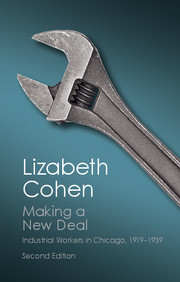Book contents
- Frontmatter
- Dedication
- Contents
- List of Illustrations
- List of Tables
- Acknowledgments
- Preface to the Second Edition
- Making a New Deal: Second Edition
- Introduction
- 1 Living and Working in Chicago in 1919
- 2 Ethnicity in the New Era
- 3 Encountering Mass Culture
- 4 Contested Loyalty at the Workplace
- 5 Adrift in the Great Depression
- 6 Workers Make a New Deal
- 7 Becoming a Union Rank and File
- 8 Workers' Common Ground
- Conclusion
- Notes
- Index
3 - Encountering Mass Culture
from Making a New Deal: Second Edition
Published online by Cambridge University Press: 05 October 2014
- Frontmatter
- Dedication
- Contents
- List of Illustrations
- List of Tables
- Acknowledgments
- Preface to the Second Edition
- Making a New Deal: Second Edition
- Introduction
- 1 Living and Working in Chicago in 1919
- 2 Ethnicity in the New Era
- 3 Encountering Mass Culture
- 4 Contested Loyalty at the Workplace
- 5 Adrift in the Great Depression
- 6 Workers Make a New Deal
- 7 Becoming a Union Rank and File
- 8 Workers' Common Ground
- Conclusion
- Notes
- Index
Summary
The J. Walter Thompson Company, the leading advertising agency in the country, devoted the July 1, 1926, issue of its in-house newsletter to the “New National Market.” The newsletter claimed that because of a rising standard of living but more crucially because of the impact of nationally circulated publications, syndicated news features, motion pictures, automobiles, standardized merchandise, and most recently the radio, “we are fast getting to be a nation which lives to pattern everywhere.” With each year, the “lines of demarcation” between social classes and between the city, the small town, and the farm had become less clear. For advertisers, this homogenization of American society – both vertically across classes and horizontally across regions – offered the opportunity of appealing to a truly mass market: “Millions of families regarded almost as recently as a few months ago as poor prospects for many kinds of merchandise, are now the best sort of prospects.” Mass culture and consumption, the ad men argued, were standardizing the way Americans lived and cultivating them for future harvests.
Confidence in the integrative power of mass culture did not reside just on Madison Avenue. The assumption was present everywhere in the 1920s.
- Type
- Chapter
- Information
- Making a New DealIndustrial Workers in Chicago, 1919–1939, pp. 99 - 158Publisher: Cambridge University PressPrint publication year: 2014



